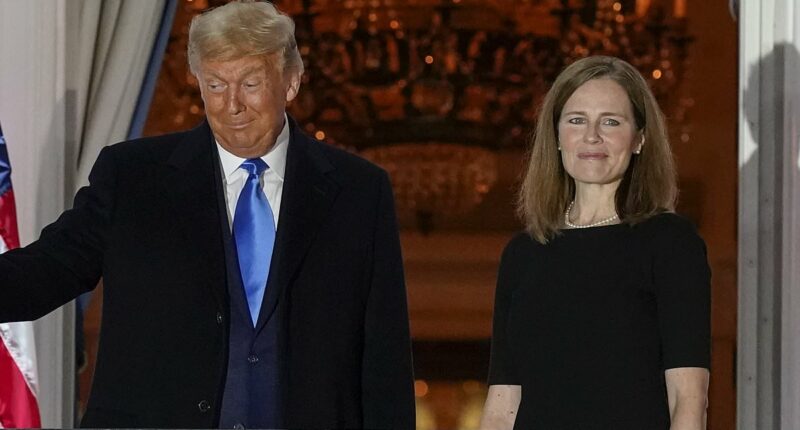Share this @internewscast.com
Justice Amy Coney Barrett has dismissed assertions that the Supreme Court has endowed Donald Trump with unchecked power regarding his agenda to deport illegal immigrants and overhaul the federal workforce.
In her first television interview since succeeding the late Justice Ruth Bader Ginsburg in 2020, Barrett, appointed by Trump, also criticized Hillary Clinton’s ominous forecast concerning the future of LGBTQ rights.
In the interview with CBS, Barrett was questioned about criticisms suggesting that the Supreme Court has veered ‘to the right’ with her appointment and is failing to limit Trump’s extensive influence on immigration policies, significant federal workforce reductions, and the National Guard’s role.
Barrett stated, ‘It’s not within our role to oversee and determine whether a current officeholder in this specific timeframe is…,’ pausing before continuing, ‘to adopt a political stance.’
‘That’s the job of journalists, that’s the job of other politicians, or that’s the job of the people. But our job is to decide these legal questions.
‘We’re trying to get the law right.’
The Supreme Court has permitted some of Trump’s contentious policies, such as frequent deportations and large-scale federal workforce reductions, to advance while various lawsuits are processed in lower courts.

Justice Amy Coney Barrett rubbished claims the Supreme Court has given President Donald Trump untapped power

Barrett was also confronted with the ramifications of her crucial vote to overturn Roe v. Wade in 2022

Barrett (top left) swatted away observations that the Supreme Court has ‘shifted to the right’ since her appointment
But Barrett doesn’t necessarily see this as a shift to the right, arguing politics is not relevant for her when she makes a decision.
Instead, she said she approaches each case with an open mind, relying on briefs, oral arguments, her law clerks and colleagues to form her opinion.
‘At any step of that process, I might change my mind from my initial reaction,’ she said. ‘In fact, I often do.’
For that reason, Barrett refused to be drawn on generic questions about the constitutional limitations of some of Trump’s policies.
On tariffs, she said: ‘That one actually is pending in the courts, and we may well (dare I say likely will) see that case.
‘Frankly, I’m still forming my opinion on this matter. If the case comes before us, after thoroughly examining all pertinent information, I’ll reach a decision,’ she stated.
She said weighing in on Trump’s decision to deploy the National Guard in Democrat-led cities to reel in crime, or on his tariff regime, would actions be ‘the opposite of the judicial rule.’

The Supreme Court has allowed Trump’s most controversial policies – including routine deportations

Barrett enjoyed a meteoric rise after Trump plucked her out of Indiana, where she was teaching at a college, for a role on the Supreme Court
On August 26, when challenged about his use of the National Guard, Trump sensationally said: ‘Not that I don’t have – I would – the right to do anything I want to do.
‘I’m the president of the United States. If I think our country is in danger – and it is in danger in these cities – I can do it.’
Barrett was also confronted with the ramifications of her crucial vote to overturn Roe v. Wade in 2022, ending nearly 50 years of precedent which constitutionally enshrined a woman’s right to an abortion.
CBS said it was just one example proving Barrett, a 53-year-old mother-of-seven, had become ‘the most influential justice’ on the court.
Last month, former presidential candidate and Secretary of State Hillary Clinton warned the Supreme Court could ‘do to gay marriage what they did to abortion.’
‘American voters, and to some extent the American media, don’t understand how many years the Republicans have been working in order to get us to this point,’ she said.

Trump has also been able to proceed with his gutting of the federal workforce

Barrett maintains she does not consider politics when she is making a decision in a case
‘It took 50 years to overturn Roe v. Wade. The Supreme Court will hear a case about gay marriage… they will send it back to the states.’
‘Anybody in a committed relationship out there in the LGBTQ community, you ought to consider getting married because I don’t think they’ll undo existing marriages, but I fear they will undo the national right.’
But Barrett dismissed Clinton’s fears, insisting she and her colleagues ‘have to tune those things out’ to get on with their jobs.
She also noted that the rights to marry, use birth control and raise children are ‘fundamental’ and part of ‘our doctrine.’
Barrett enjoyed a meteoric rise in 2020 after Trump chose her to replace the late Ruth Bader Ginsburg.
At the time, she had been a long time law professor in Indiana, but she had caught Trump’s eye several years prior during her time on the 7th Circuit.
In that position, she took conservative stances on hot-button conservative issues like abortion and gun control.
















